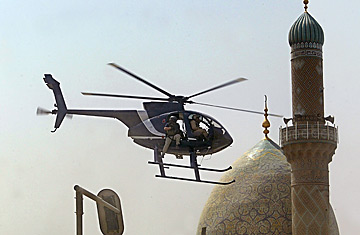
A Blackwater security firm helicopter flies low above the scene where a roadside bomb exploded near the Iranian embassy in central Baghdad.
A U.S. government official tells TIME that when President Bush and Iraqi Prime Minister Nouri al-Maliki sit down for a scheduled bilateral meeting next Tuesday in New York they will discuss the recent episode in Baghdad involving the Blackwater security firm, which is critical to the way American diplomats operate in Iraq. Already, during a telephone conversation on Monday night, Maliki and U.S. Secretary of State Condoleezza Rice agreed that U.S. diplomats must be free to travel around Iraq, but how they will do that is now a point of contention. Since Iraq suspended Blackwater's license following the Sunday firefight, American diplomats have not been able to travel outside the Green Zone to visit ministries and other Iraqi sites. "We're there to strengthen the capacity of the Iraqi Government. We're not able to do that all in the Green Zone," Rice said she told Maliki in the conversation. And, she said, he agreed.
Rice told the press traveling with her on a Mideast mission that the U.S. Deputy Chief of Mission in Baghdad met with Maliki's office on Tuesday and the two governments are negotiating a way for the embassy to operate safely and allay Iraq's concerns about what it says is a pattern of excessive use of force by Blackwater. "They are working toward mechanisms that might allow us to address these issues together," she said during an overnight flight to Jerusalem, where she is meeting with Israeli and Palestinian leaders in the run-up to a possible November summit.
But Maliki offered his own solution on Wednesday, recommending that the U.S. embassy in Baghdad change the company it uses to provide security. "This crime has generated a lot of hatred in the government and the people against Blackwater," Maliki told reporters. "For their own interests, the Americans should hire a new company to protect their people so they can move freely." The Iraqi premier also ordered a full investigation into Sunday's firefight. Maliki has made it clear that he will raise the subject with Bush during their New York meeting, saying he won't tolerate "the killing of our citizens in cold blood." A U.S. government report of the incident that first appeared on TIME.com, says that Blackwater guards shot back only in response to small arms fire. The company has said its employees killed and wounded armed insurgents, not civilians. Yesterday, Iraq's Ministry of the Interior released an account of the incident that differed substantially from the U.S. report. The ministry said that Blackwater initiated the firefight, killing as many as 20 civilians.
Maliki told senior aides that he wants to look at ways to change Order 17, a law from early in the post-war occupation of Iraq that some believe provides expatriate contractors immunity from Iraqi prosecution.
Since Sept. 11, the State Department has issued hundreds of millions of dollars in contracts to security companies like Blackwater to augment its own, internal Diplomatic Security office that protects U.S. diplomats overseas. What was viewed as a short-term need has extended into a six-year investment. When asked if the State Department should reconsider its reliance on such companies to secure U.S. personnel, Rice said not yet. "It's very early to try to do that kind of analysis, I think." In the meantime, the State Department has just announced the formation of a new, joint U.S.-Iraqi commission that will handle details of the Blackwater episode, an apparent attempt to defuse the growing controversy. Further details are expected to come from the State Department soon — in particular whether the commission will also deal with the more general problem of thousands of other private security personnel from a variety of companies who guard diplomats and perform other sensitive functions in the country.
